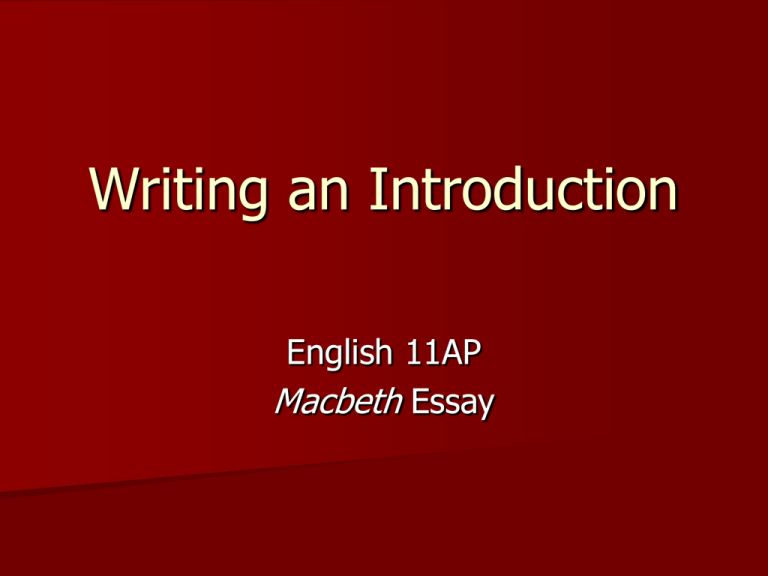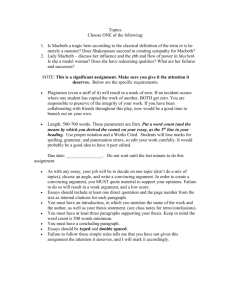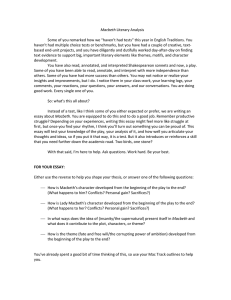Writing an Introduction (Macbeth)
advertisement

Writing an Introduction English 11AP Macbeth Essay Purpose of an Introduction: 1. To get the reader's attention. 2. To lead the reader into your paper and to establish your thesis. 3. To control your essay by moving from a general discussion of the subject to the specific thesis that your paper will prove. How do I begin? You could begin with an attention grabber. This information must be true and verifiable, and it doesn't need to be totally new to your readers. It could simply be a pertinent fact that explicitly illustrates the point you wish to make. If you begin with a piece of startling information, follow it with a sentence or two of elaboration. Example: Insomnia kills. The 1989 Exxon Valdez oil spill off Alaska, the Challenger space shuttle disaster and the Chernobyl nuclear accident have all been attributed to human errors in which sleepdeprivation played a role. It is no surprise, then, that Shakespeare’s title character in Macbeth makes rash and life-altering choices after going too long without sleep. His guiltinduced insomnia caused his paranoia, his murders of Banquo and the Macduff household, and his violent rampage at the end of the play. Lack of sleep was the cause of the tragedy in Macbeth. How do I begin? You could begin with a quotation from the play that reflects your thesis. Follow this quote with a sentence or two of elaboration. Example: “By the pricking of my thumbs/something wicked this way comes.” (IV, i, 44-45) In Shakespeare’s Macbeth, the title character is inherently evil, with few, if any, redeeming qualities. The heartless murders of Duncan, Banquo, the Macduff family and young Siward, as well as the blasé response to the death of Lady Macbeth reflect a heart incapable of love and decency. Macbeth’s own death is no tragedy; rather it is the appropriate end for a tyrant who is pure evil. How do I begin? If you tread carefully, you can begin with an anecdote. An anecdote is a story that illustrates a point. Be sure your anecdote is short, to the point, and relevant to your topic. This can be a very effective opener for your essay, but use it cautiously, as it could sound either hokey or irrelevant. Example: A fortune-teller once told my friend Pam that she would meet and marry a red-haired man. Two days later she met the new custodian at her school, who happened to be young, handsome, and ginger. Believing fate to be at play, she pursued the young man, bought him gifts, broke him up with his long-time girlfriend, and married him within six months. Much like in Shakespeare’s Macbeth, it was the prediction that spurred her to action. The character Macbeth, like my friend Pam, fell prey to selffulfilling prophecy and was the author of his own misfortune. How do I begin? Summary Information: A few sentences explaining your topic in general terms can lead the reader gently to your thesis. Each sentence can become gradually more specific, until you reach your thesis. This is called the “funneled” form of introduction, and it is quite popular. Example: Shakespeare’s Macbeth was not a good King. He gained his crown by killing the previous King and then maintained it through treacherous means. He was paranoid, uncaring, maniacal and cold, and perhaps worst of all, he was stupid. Macbeth allowed himself to be influenced by his heartless and ambitious wife as well as three toothless old hags with little to recommend them other than a bag of rotting animal parts. Although he had many faults, it was Macbeth’s stupidity that led to the tragedy at the end of the play. How NOT to Begin! “Webster’s Dictionary defines ‘guilt’ as: ‘a feeling of responsibility or remorse for some offense, crime, wrong, etc., whether real or imagined.’”…EEK! English teachers see this all the time, and it HURTS! “In this essay I will…” Argh! That’s about as subtle as a train wreck. The passive voice is appropriate for formal, persuasive essays. Elements of an Introduction An introduction should include: - A brief summary of the action of the play or a description of the characters being discussed - A hint as to the topics to be discussed in the essay – this can be specific, or more general if there are numerous topics being discussed - A THESIS – What will you prove to your reader in this essay? DESPITE WHAT WE TOLD YOU IN GRADE 10, THE ORDER DOES NOT MATTER; WRITE WHAT WORKS FOR YOU.





